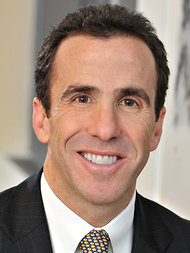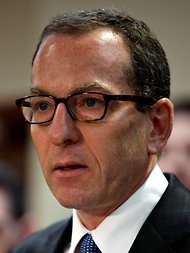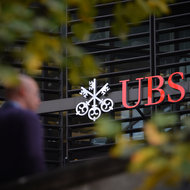9 p.m. | Updated
 Dave Cross PhotographyDavid Meister of the Commodity Futures Trading Commission.
Dave Cross PhotographyDavid Meister of the Commodity Futures Trading Commission.
American and British authorities are shifting to an aggressive new phase in their broad investigation of interest-rate manipulation as they identify potential criminal targets and complete settlements with some of the world’s biggest banks.
In a sign of the escalation, Britain’s Serious Fraud Office made the first arrests in connection with the rate-rigging inquiry on Tuesday.
In a predawn raid, police took three men into custody at their homes on the outskirts of London. One of the men is Thomas Hayes, 33, a former trader at UBS and Citigroup, according to people briefed on the matter who spoke on condition of anonymity. The other two men arrested worked for the British brokerage firm R P Martin, said another person briefed on the matter.
Related Links
British authorities typically make arrests in the early stages of an inquiry, and the actions on Tuesday do not necessarily signal that the individuals will be charged with wrongdoing.
UBS, Citigroup and R P Martin declined to comment. A lawyer for Mr. Hayes, who has not been accused of any wrongdoing, could not be reached for comment.
Mr. Hayes also faces scrutiny from American authorities. The Justice Department could file criminal charges against him in the coming weeks, according to people briefed on the matter who spoke on the condition of anonymity because the investigation is continuing. The people cautioned that American authorities had not made a decision about charging Mr. Hayes and might have difficulty extraditing him to the United States.
 Joshua Lott/ReutersLanny A. Breuer, the head of the Justice Department’s criminal division.
Joshua Lott/ReutersLanny A. Breuer, the head of the Justice Department’s criminal division.
The evidence against Mr. Hayes is considered a linchpin in a broader case involving UBS, the Swiss banking giant. UBS is expected to settle accusations that Mr. Hayes and other employees carried out a scheme to push interest rates up and down to bolster trading profits, according to the people briefed on the matter. The people said the expected settlement, which could come as early as Friday, would include more than $450 million in fines and wider sanctions, the largest penalties to date related to the rate-rigging inquiry.
Building on the momentum in the UBS inquiry, authorities are preparing a spate of civil and criminal actions. After gathering thousands of internal bank e-mails and interviewing dozens of employees over the last four years, regulators and prosecutors are using the evidence to negotiate settlements with banks and draw up arrest orders for individuals.
Libor Explained
 Carl Court/Agence France-Presse — Getty ImagesOffices of the Swiss bank UBS in London.
Carl Court/Agence France-Presse — Getty ImagesOffices of the Swiss bank UBS in London.
The cases have deep roots. Regulators around the world have been investigating more than a dozen big banks that help set benchmarks like the London interbank offered rate, or Libor. Such benchmark rates are used to determine the borrowing costs for trillions of dollars in financial products, including credit cards, student loans and mortgages.
In June, authorities scored their first major victory, extracting a $450 million settlement with Barclays, the big British bank. The Commodity Futures Trading Commission, the Justice Department and the Financial Services Authority of Britain claimed that Barclays traders tried to manipulate Libor to bolster profits. They also claimed that Barclays had submitted low rates to deflect concerns about its health during the financial crisis.
Other banks are bracing for the potential fallout, including major fines and regulatory sanctions. The Royal Bank of Scotland, which is in settlement talks with regulators, said it would probably disclose fines before its next earnings report, in February. Deutsche Bank, Germany’s largest bank, said in November that it had put aside money for potential penalties related to the Libor case.
Even as authorities prepare a new wave of actions, they have not always coordinated with each other. Some American authorities were caught off guard when the Serious Fraud Office announced the arrests on Tuesday. And the various regulators are still not certain if they will jointly announce the UBS settlement this month, according to the people briefed on the matter.
The Justice Department’s criminal division and the Commodity Futures Trading Commission’s enforcement unit, in contrast, have kept close ties. Lanny A. Breuer, head of the Justice Department’s criminal division, and David Meister, who runs the commission’s enforcement team, are said to be friends. As they built Libor cases over the last two years, the units have shared evidence that they say points to a systemic problem with the rate-setting processes.
The Serious Fraud Office is a relative newcomer to the Libor case. After hesitating to enter the investigation, the agency opened a criminal inquiry into Libor manipulation in July, in response to the furor over the rate-rigging scandal at Barclays.
“The S.F.O. works incredibly slowly,” said a defense lawyer representing other individuals implicated in the Libor inquiry, who spoke on the condition of anonymity. “It’s not surprising that people have been arrested. But how long it will take to lead to criminal charges is another matter.”
Under British law, London police can hold the three men arrested on Tuesday for 24 hours. Authorities can apply for an extension if they need more time for questioning the men.
Mr. Hayes, who got his start at the Royal Bank of Canada, built his reputation as an interest rates trader at UBS, a person briefed on the matter said. He worked at UBS’s Tokyo office from about 2006 to 2009 before departing for Citigroup. At the American bank, he received a promotion, earning a director title.
Mr. Hayes spent less than six months trading at Citigroup. The bank suspended him in 2010 after he approached a London trading desk about improperly influencing the yen-denominated Libor rates, a person briefed on the matter said. He was fired in September 2010, and the bank reported his suspected actions to authorities.
UBS also raised concerns about Mr. Hayes to the Commodity Futures Trading Commission, according to another person briefed on the matter. In the course of an internal investigation, the Swiss bank concluded that Mr. Hayes had worked with traders at other banks to influence rates, according to officials and court documents.
At the time, the trading commission ordered other institutions that helped set Libor rates to conduct similar inquiries. Those investigations have formed the basis of the agency’s cases.
Mr. Hayes also emerged in court documents filed this year by Canadian authorities. The documents — collected by Canada’s Competition Bureau, the country’s antitrust authority — highlight an alleged scheme in which Mr. Hayes and other traders may have colluded to influence yen Libor rates. The Canadian investigation, which covers conduct from 2007 to 2010, also referred to traders at JPMorgan Chase, HSBC, Deutsche Bank and the Royal Bank of Scotland.
The traders, the documents said, at times corresponded using instant messages on Bloomberg machines. While the activity took place outside Canada, the trading affected financial contracts in the country that were pegged to yen Libor.
The traders further asked middlemen at brokerage firms “to use their influence” on other banks that set Libor, according to the documents. The brokers included employees at R P Martin, a person briefed on the matter said.
“Traders at participants’ banks communicated with each other their desire to see a higher or lower yen Libor to aid their trading positions,” the Canadian documents said.
Azam Ahmed and Ian Austen contributed reporting.
Article source: http://dealbook.nytimes.com/2012/12/11/three-arrested-in-connection-to-rate-rigging-scandal/?partner=rss&emc=rss
Speak Your Mind
You must be logged in to post a comment.